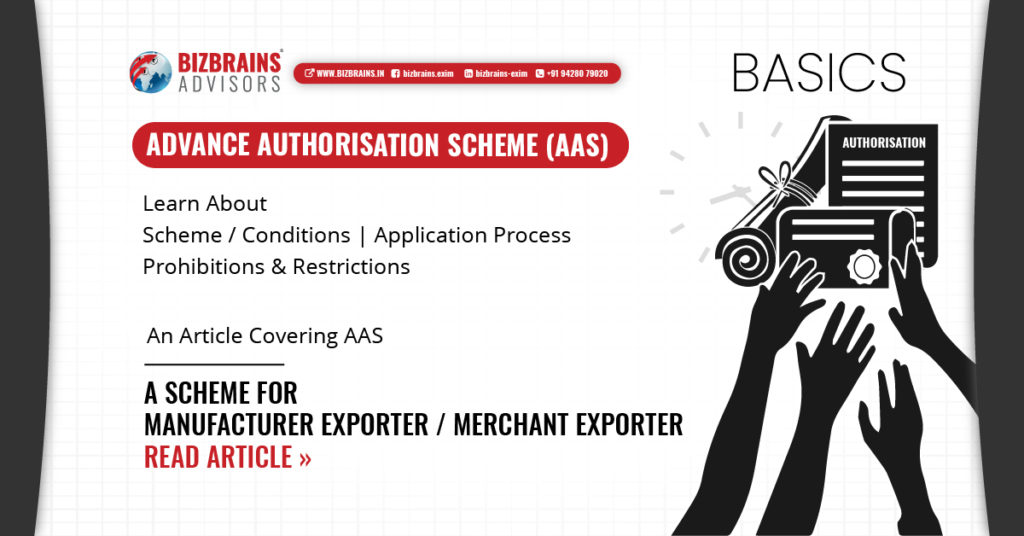
The Advance Authorisation Scheme (AAS) is an incentive for exporters offered by the Indian government. It is provided through the Directorate General of Foreign Trade (DGFT) and incentivizes the import of additives and raw materials that are physically incorporated into a product that is bound for exports.
As Part of Back to Basics - Let's Explore more about AAS.
- Advanced Authorisation scheme, what is it?
- How a manufacturer / merchant can obtain Advance Authorisation?
- Sounds great! How do I apply for Advance Authorisation Scheme?
- Annual requirements? yes you can do it
- Advanced Authorisation Conditions
- Prohibitions and restrictions under Advance Authorisation Scheme
Advanced Authorisation scheme, what is it?
Let's start with basics, Definition and scope of the Scheme
The scheme allows duty free import of inputs, which are physically incorporated in an export product. In addition to any inputs, packaging material, fuel, oil, catalyst which is consumed/utilized in the process of production, is also allowed.
The quantity of inputs allowed for a given product is based on specific norms defined for that export product, which considers the wastage generated in the manufacturing process. DGFT provides a sector-wise list of Standard Input Output Norms (SION) under which the exporters may apply for their ad-hoc norms in cases where the SION does not suit the exporter.
The present Foreign Trade Policy (2015-2020) aims to keep in line with the ‘Make in India’ vision and support exports made by Special Economic Zones (SEZs), Export Oriented Units (EOUs), etc. It also contains various export promotion schemes which involve either the exemption or remission of customs duty. The Advance Authorization Scheme is one such export promotion scheme.
The inputs imported are exempt from duties like Basic Customs Duty, Additional Customs Duty, Education Cess, Anti-dumping duty, Safeguard Duty and Transition Product-Specific Safeguard duty, Integrated tax, and Compensation Cess, wherever applicable, subject to certain conditions.
How a manufacturer / merchant can obtain Advance Authorisation?
Advance Authorisation can be issued either to a manufacturer exporter or merchant exporter tied to supporting manufacturer(s) for:
- Physical exports (including exports to SEZ); and/ or
- Intermediate supplies; and /or
- Supply of goods to the categories mentioned in paragraph 8.2 (b), (c), (d), (e), (f), (g), (i) and (j) of FTP;
- Supply of ‘stores’ on board of foreign going vessel/ aircraft subject to condition that there is specific SION in respect of item(s) supplied.
- Duty free import of mandatory spares up to 10% of CIF value of Authorisation which are required to be exported/ supplied with resultant product are allowed under Advance Authorisation
In addition, in respect of supply of goods to specified projects mentioned in paragraph 8.2 (d), (e), (f), (g) and (j) of FTP, an Advance Authorisation can also be availed by sub-contractor to such project provided name of sub- contractor(s) appears in main contract.
Such Authorisation can also be issued for supplies made to United Nations Organisations or under Aid Programme of the United Nations or other multilateral agencies and which are paid for in free foreign exchange.
Sounds great! How do I apply for Advance Authorisation Scheme?
Taxpayer can claim a refund in GST in the following scenarios :
- The applicant should have an IEC certification. For information about the new procedure of IEC application, refer to our Linkedin Post about new IEC Portal.
- The applicant has to fill up ANF 4A (Aayat Niryat Form 4A) which is available on DGFT’s website.
- A Certificate from a Chartered Engineer who has been not been penalised in the last five years under FT(D&R) Act 1992, Customs Act 1962, Central Excise Act 1944, GST Acts and allied acts and rules made there under shall only be accepted for grant of Authorisation under this.
- Detailed procedure for administering the scheme shall be prescribed in the Handbook of Procedures.
- An exporter (manufacturer or merchant) who holds AEO Certificate under Common Accreditation Programme of CBEC is eligible to opt for this.
Annual requirements? yes you can do it
Yes, Advance Authorisation can also be issued for annual requirement
For such cases:
Status Certificate holder and all other categories of exporters having past export performance (in preceding two years) shall be entitled for Advance Authorisation for Annual Requirement.
Entitlement in terms of CIF value of imports shall be up to 300% of the FOB value of physical export and / or FOR value of deemed export in preceding licensing year or Rs 1 crore, whichever is higher.
Advanced Authorisation Conditions
- The Advance Authorization issued and the materials imported thereunder will be with actual user condition. This means that the actual user alone may import such goods. The authorization will not be transferable even after completion of export obligation.
- Advance Authorisations necessitate exports with a minimum value addition of 15 %, except for items in Gems & Jewellery sector, for which value addition would be as per paragraph 4A.2.1. of HBP v.1. Exports to SEZ Units/ supplies to Developers / Co-Developers, irrespective of currency of realization, would also be covered. Value addition (VA) for the purpose of this (except for Gems and Jewellery Sector) shall be

- For physical exports for which payments are not received in freely convertible currency, same shall be subject to value addition as specified in Appendix-11 of HBP v1.
- In case of Authorisation for import of Tea, minimum value addition under Advance Authorisation shall be 50%.
- Similarly, in case of spices {covered by Chapter 9 of ITC(HS)}, duty free import of spices shall be permitted only for value addition purposes like crushing / grinding / sterilization or for manufacture of oils and oleoresins and not for simple cleaning, grading, re-packing etc.
Prohibitions and restrictions under Advance Authorisation Scheme
- Prohibited items of imports mentioned in ITC(HS) shall not be imported under Advance Authorisation / DFIA. Further items reserved for imports by STEs (State Trading Enterprises) cannot be imported against Advance Authorisation / DFIA. However, those items can be procured from STEs against ARO (Advance Release Order) or Invalidation letter.
- STEs are also allowed to sell goods on High Sea Sale basis to holders of Advance Authorisation / DFIA holder.
- In addition, STEs are permitted to issue “No Objection Certificate (NOC)” for import by advance Authorisation/ DFIA holder. Authorisation Holder would be required to file Quarterly Returns of imports effected against such NOC to concerned STE and STE would submit half-yearly import figures of such imports to concerned administrative Department for monitoring with a copy endorsed to DGFT.
- Similarly prohibited items of exports mentioned in ITC(HS) shall not be exported under Advance Authorisation / DFIA scheme. Export of restricted items shall be subject to all conditionalities or requirements of Export Authorisation or permission, as may be required, under Schedule II of ITC (HS).
We understand that the plethora of conditions and rules mentioned along with complex definitions are difficult to comprehend all at once. Hence, we at Bizbrains are always available to resolve your queries and doubts, however big or small
For more content and updates follow us on LinkedIn, Twitter and Facebook; our handle is Bizbrains Advisors. Get a heads up on various schemes on export-import activity and let us know your thoughts in comment section!

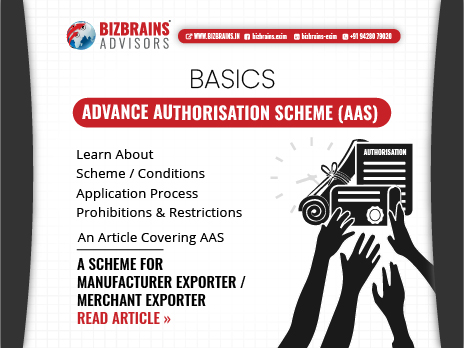
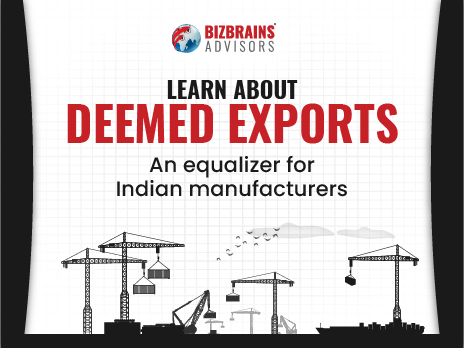
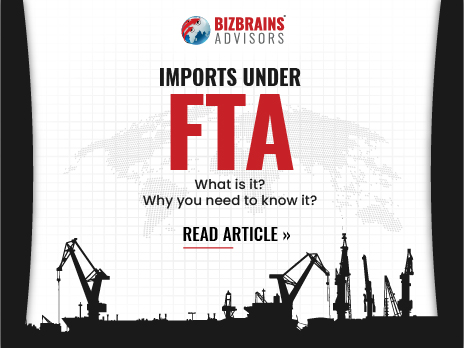
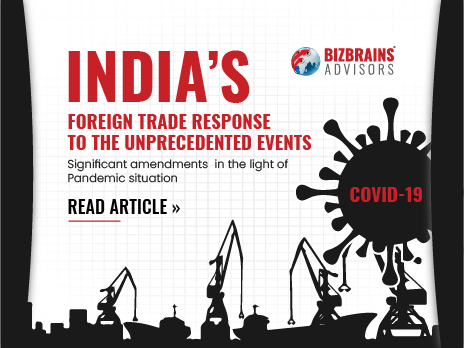
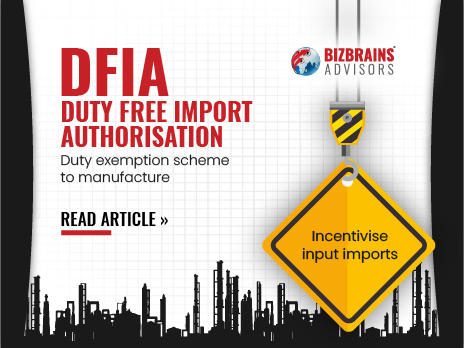
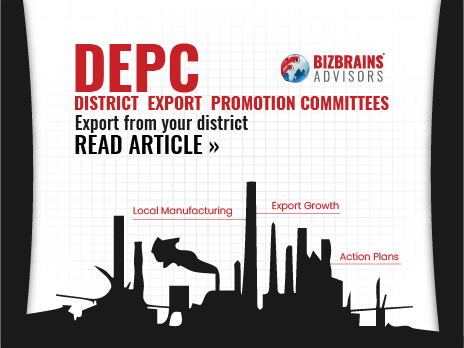
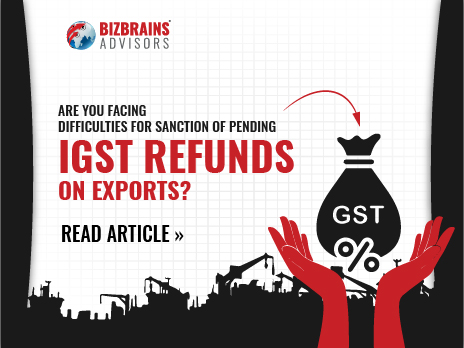
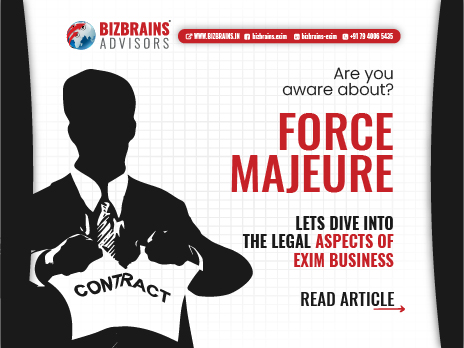
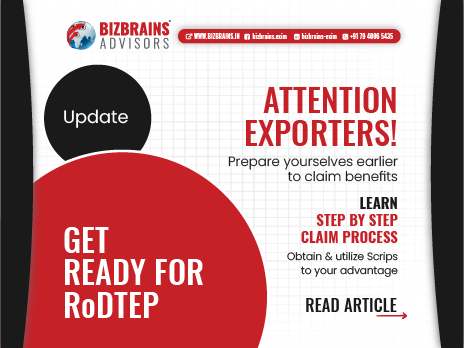
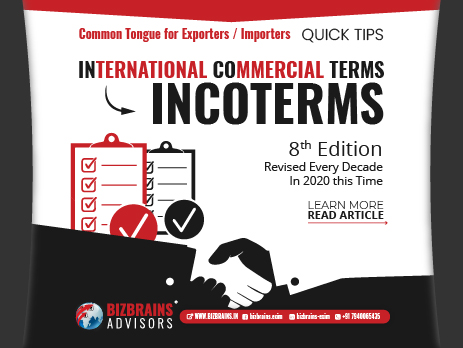
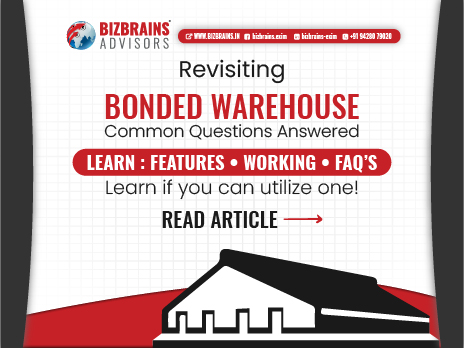
One Response